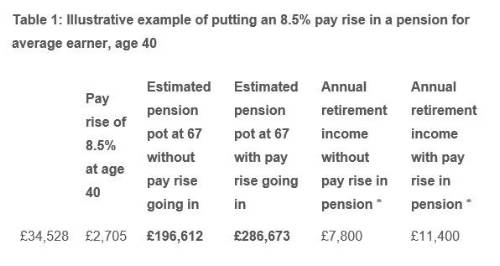Regular pay including bonuses in the UK rose 8.5% in the year to July 2023, taking the average annual pay to £34,528.
While rising prices might take the shine off a pay rise, for those able to consider putting part or all of an increase into their pension, the reward for doing so in retirement can be significant.
PensionBee calculated that a 40-year old on an annual salary of £34,528, who puts a 8.5% pay rise of £2,705 (or £225 a month extra) into their pension each year, could boost their pension pot by £90,000 at retirement. At age 67, this person could have an overall pension pot worth £286,673, rather than £196,612, potentially giving around £3,600 a year in additional annual retirement income after the 25% tax-free lump sum is taken: more than the amount of annual income given up today.
Becky O’Connor, Director of Public Affairs at PensionBee, said: “If you can live without the extra income today, then putting your pay rise in a pension can mean having an even bigger ‘pay rise’ later on, from your pension income.
“A pay rise is a prime opportunity to boost your pension because you may not miss money you never had.
“Most employers will allow you to increase your contributions to whatever you want, either as a percentage of salary or in pounds and pence, so if you know a rise is due, think about whether or not you can make the most of it in the long term by putting it in your pension.
“This can be especially beneficial for those workers approaching the age they can first access their pension, at 55 (rising to 57 in 2028). For them, it’s not that long to wait to get the benefit of the decision.”

Source: PensionBee. Assumptions; 8.5% salary rise at age 40 to £34,528; existing pension pot of £50,000, salary rises of 1% each year thereafter, 0.7% annual fee, 8% contributions and 2.5% real investment growth. Retirement income estimates use drawdown after taking 25% lump sum, 2% real investment growth a year, income to age 90, from age 67. For illustrative purposes only.
Tips for putting a pay rise in your pension:
Some employers offer salary sacrifice schemes that allow employees to arrange for their pay rise or annual bonus to be contributed directly to their pension. This can be a convenient way to automate contributions so it’s worth checking with your employer if this is an option available to you. It can also be a smart financial move as it helps reduce your taxable income amount for that year.
If you are a higher or additional rate taxpayer or on the cusp of becoming one, this may be particularly advantageous as higher earners can claim extra tax relief at their marginal rate of income tax of 40% or 45% on pension contributions. This can be enjoyed in the form of a reduction in your annual tax bill or a tax rebate.
It's important to remember that unlike basic tax relief, which is applied automatically, you might need to claim higher or additional rate tax relief on pension contributions yourself, if your pension contributions are made via the ‘relief at source’ method. If it’s a net pay or salary sacrifice scheme, your employer should add the relief for you.
There is also an Annual Allowance to consider. This is the maximum amount you can contribute to your pension each year while still receiving tax relief. For 2023/2024, this stands at £60,000 - if you exceed this limit you can incur tax penalties.
Don’t forget that you don’t need to put your whole pay rise or bonus in a pension.
|

